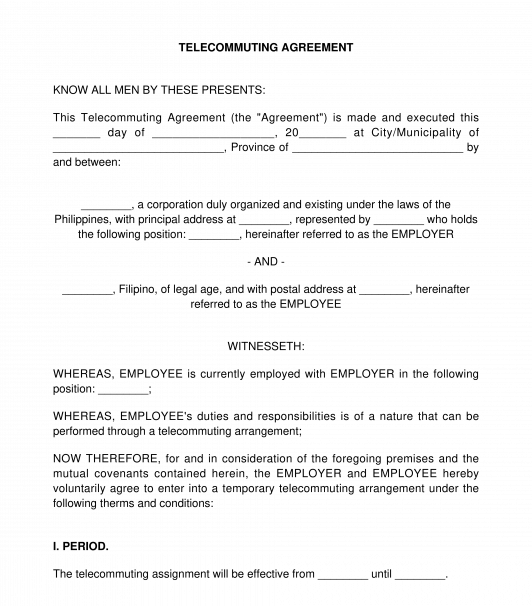 09/08/2025
09/08/2025

Answer a few questions and your document is created automatically.

Your document is ready! You will receive it in Word and PDF formats. You will be able to modify it.

 09/08/2025
09/08/2025
 Word and PDF
Word and PDF
 4 to 6 pages
4 to 6 pages
A Telecommuting Agreement is an agreement between an employer and their employee wherein the employee is assigned to work in an alternative workplace. An alternative workplace is a location that is different from the employer's regular place of business. An example of an alternative workplace is the employee's home.
In a Telecommuting Agreement, the employee still performs the same job functions provided in their employment contract in the alternative workplace. The employer and employee may still agree that the employee still report for work in the regular place of business on some days or that they may still be required to report for work in the regular workplace when their physical presence is needed, such as for evaluations, trainings, meetings, etc.
Take note that the employee subject to the Telecommuting Agreement should receive the same treatment as employees who are working in the employer's regular place of business. Likewise, they are still entitled to a rate of pay, including overtime, night shift differential and other monetary benefits not lower than those provided in applicable laws or the collective bargaining agreement, if there is one.
Employees under the Telecommuting Agreement are also entitled to rest days, regular holidays, and special holidays despite the fact that they do not regularly report for work in the employer's regular place of business.
When an employer has employees under telecommuting agreements, it is important to establish standards for data protection. This may include a limitation on the equipment and connections that may be used or a proper way of storing and disposing documents.
This document was drafted specifically for current employees. If the employer is hiring a new person, an Employment Contract can be used.
The user should enter all the information required to complete the document. Once the document is completed, the user should print at least two copies (one for the employer and one for the employee). The employer and the employee should review the information on the document and, if all the information is correct, the employer and the employee should sign both copies of the document. Each party should keep a copy for their records.
Notarizing the document
Notarizing the telecommuting agreement is optional. If the parties choose to have the document notarized, a third copy of the document should be printed and signed by the employer and the employee. This copy will be for the notary public. The employer and the employee should then personally appear before a notary public with all the copies of the document and a competent proof of identification. A competent proof of identification is a current identification document (I.D. that is not yet expired) that was issued by an official agency bearing their photograph and signature.
The employer and employee must then acknowledge that the signatures on the document were voluntarily affixed by them for the purpose written in the document and that they signed the document as their free and voluntary act and deed. If the employer is an organization and a representative has signed the document then they must also state that they have the authority to sign the document as a representative.
The Telecommuting Act (Republic Act No. 11165) is the law that primarily governs telecommuting arrangements between an employer and an employee and its implementing rules and regulations provides the details on the proper implementation of the Telecommuting Act. However, other laws such as the Labor Code of the Philippines, laws on minimum wage and other special laws may still apply.
You fill out a form. The document is created before your eyes as you respond to the questions.
At the end, you receive it in Word and PDF formats. You can modify it and reuse it.
A guide to help you: What to do after Creating a Contract?
Telecommuting Agreement - sample template
Country: Philippines